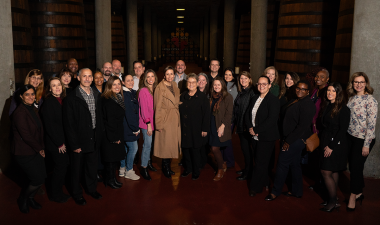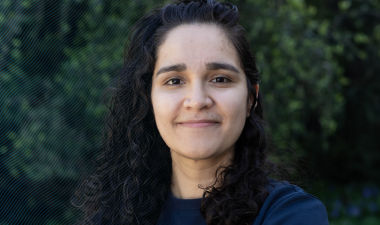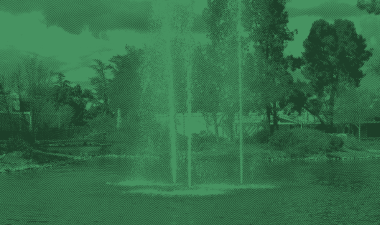Even before calls for police reform began after high-profile shootings by law enforcement, University Police Department (UPD) Officer Quenna Martinez understood strength didn’t come with force or weapons.
Whether at her first job as an officer at San Francisco State University or during her seven years at Stanislaus State, Martinez has never thought of the uniform or weapons as the keys to being able to “protect and serve.”
“To me it’s being out there talking to students and being engaged in programming and collaboration,” Martinez said.
Martinez backs up that philosophy with action. Eight years after earning her Bachelor of Arts in Criminal Justice, the Modesto native returned to Stan State in 2016 as a member of UPD and has since earned a Master of Arts in Counseling.
“I saw the way law enforcement was going. There were a lot of mental health calls and that led me toward counseling,” said Martinez, whose family jokes her career path was set when she was allowed to turn on a patrol car siren during a police department visit to her elementary school.
The State of California mandates mental health training for law enforcement as one of its standards, but “there’s always an opportunity for more professional growth,” Martinez said.
With support from her supervisors, Martinez began the master’s program taking night courses in 2017 and earned her degree as a professional clinical counselor.
She immediately saw its value.
“Some of the things they were talking about in class — the age when you start seeing things, the science of it — were things I was already seeing in the field,” Martinez said. “It made sense. They talked about theories in the textbook, and it all made sense and put everything in the field into perspective.
“There were things I added to my duty pack that I carry day in and day out because of what I learned.”
Learning to be a better listener has helped her defuse situations in the field, which not only covers the Stan State campus, but sometimes involves assisting the Turlock Police Department with calls nearby.
“I take extra time to listen, to understand, maybe use more tactics of communication, de-escalation, key phrases,” Martinez said. “We talk about what happens in counseling with no walls, being able to listen and give people that space. That’s helped me to slow things down and ask open-ended questions.
“When you get the chance to listen to someone — a homeless person or a student who’s in crisis — and you hear the entire background, it’s like, wow. We have those resiliency posters on campus and Warrior Strong. You live it and breathe it in that moment listening to a student or faculty or staff member.”
Her understanding of the Stan State community she serves grew even deeper during the 2021-22 academic year, when she went from presenting at conferences to teaching classes in addiction and human development at the request of Counselor Education Program Coordinator Suzanne Whitehead.
“I was able to see through that lens what happens in the classroom, how much effort the students put into the program and how much they care,” Martinez said. “I am humbled by what our faculty do and the positive interactions they have with students. That’s a whole new lens for me and gives me much more appreciation for our students.”
Although she valued the opportunity to teach, Martinez said for now she is focused on her role as an officer.
“If the opportunity comes up, absolutely I’m willing to teach,” she said. “It’s so rewarding, and I’m humbled by our students and all they go through to get that degree and walk that stage.”
If her UPD colleagues haven’t had that opportunity to earn a master’s degree, they are receptive to her input and the occasional training she conducts. No matter their ages or length of service, she said, officers understand how law enforcement is changing, evidenced by their regular conversations.
“I don’t know if it’s because we’re in a college setting and we’re more progressive and the training is different, but it takes a special officer to be in a university setting,” Martinez said. “It’s about talking and engaging and having community policing. Even if there is a generation gap, my colleagues recognize that this is the way it’s going, and they think it’s about time.”
Laws are constantly changing for law enforcement at the federal, state and local levels, Martinez said, but her job remains the same.
“We still have a task at hand to keep our population safe, to provide resources and to be humanistic,” Martinez said.
Being a fellow human, not just a person in uniform, always has been Martinez’s perspective from the time she started at San Francisco State, until she returned to Stan State to be closer to family.
With her master’s degree, Martinez could ditch her 35-pound equipment pack and work in a K-12 setting or private practice as some former classmates are doing. But that’s not for her.
“My colleagues and resolving problems are what keep me here,” she said. “Stan State has great students and is a great community. I could go somewhere else, but for me it’s about the people.”



